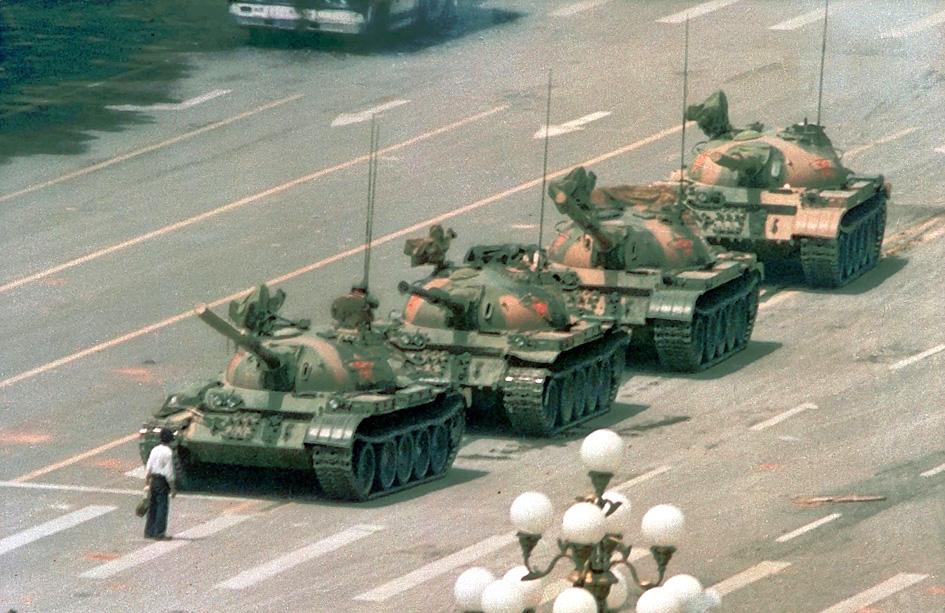Microsoft Corp has blamed human error after its search engine, Bing, blocked image and video results for the phrase “tank man” — a reference to the iconic image of a lone protester facing down tanks during the 1989 protests in Tiananmen Square — on the 32nd anniversary of the military crackdown.
Users reported that no results were shown for the search query in countries including France, Germany, Singapore, Switzerland and the US, according to Reuters and Vice News.
References to the pro-democracy protest movement have long been censored in China, where the government maintains strict control over the Internet, but the censorship by Bing extended to users outside China’s “great firewall.”

Photo: AP
Microsoft said the issue was “due to an accidental human error and we are actively working to resolve this.”
Smaller search engines, such as DuckDuckGo, that license results from Microsoft faced similar issues around “tank man” searches and said they expected a fix soon.
Rival Google showed many results for the famous image when the “tank man” search was performed on Friday and yesterday.
The incident came amid China’s crackdown on Hong Kong, where it banned the Tiananmen Square anniversary vigil for the second year in a row, and growing concern over the extent to which China can exert economic pressure to enforce its censoriousness overseas.
Just last week, US actor John Cena made a public apology for referring to Taiwan as “a country,” an offense to China, which insists that Taiwan is not an independent state.
US-based tech companies have long struggled to balance their desire to operate in China’s enormous market with the censorship demands of the government.
Microsoft Bing is one of the few foreign search engines that are accessible in China, because the company has agreed to censor results for sensitive terms such as the Dalai Lama, Tiananmen Square or Falun Gong.
In 2016, the New York Times reported that Facebook was working on a secret tool that would allow a third party to censor the platform for Chinese users in exchange for Beijing allowing Facebook to operate within the country.

INVESTIGATION: The case is the latest instance of a DPP figure being implicated in an espionage network accused of allegedly leaking information to Chinese intelligence Democratic Progressive Party (DPP) member Ho Jen-chieh (何仁傑) was detained and held incommunicado yesterday on suspicion of spying for China during his tenure as assistant to then-minister of foreign affairs Joseph Wu (吳釗燮). The Taipei District Prosecutors’ Office said Ho was implicated during its investigation into alleged spying activities by former Presidential Office consultant Wu Shang-yu (吳尚雨). Prosecutors said there is reason to believe Ho breached the National Security Act (國家安全法) by leaking classified Ministry of Foreign Affairs information to Chinese intelligence. Following interrogation, prosecutors petitioned the Taipei District Court to detain Ho, citing concerns over potential collusion or tampering of evidence. The

NEGOTIATIONS: Taiwan has good relations with Washington and the outlook for the negotiations looks promising, Minister of Economic Affairs J.W. Kuo said Taiwan’s GDP growth this year is expected to decrease by 0.43 to 1.61 percentage points due to the effects of US tariffs, National Development Council (NDC) Minister Paul Liu (劉鏡清) said at a meeting of the legislature’s Economics Committee in Taipei yesterday, citing a preliminary estimate by a private research institution. Taiwan’s economy would be significantly affected by the 32 percent “reciprocal” tariffs slapped by the US, which took effect yesterday, Liu said, adding that GDP growth could fall below 3 percent and potentially even dip below 2 percent to 1.53 percent this year. The council has commissioned another institution

TRADE: The premier pledged safeguards on ‘Made in Taiwan’ labeling, anti-dumping measures and stricter export controls to strengthen its position in trade talks Products labeled “made in Taiwan” must be genuinely made in Taiwan, Premier Cho Jung-tai (卓榮泰) said yesterday, vowing to enforce strict safeguards against “origin laundering” and initiate anti-dumping investigations to prevent China dumping its products in Taiwan. Cho made the remarks in a discussion session with representatives from industries in Kaohsiung. In response to the US government’s recent announcement of “reciprocal” tariffs on its trading partners, President William Lai (賴清德) and Cho last week began a series of consultations with industry leaders nationwide to gather feedback and address concerns. Taiwanese and US officials held a videoconference on Friday evening to discuss the

NEGOTIATIONS: The US response to the countermeasures and plans Taiwan presented has been positive, including boosting procurement and investment, the president said Taiwan is included in the first group for trade negotiations with the US, President William Lai (賴清德) said yesterday, as he seeks to shield Taiwanese exporters from a 32 percent tariff. In Washington, US Trade Representative Jamieson Greer said in an interview on Fox News on Thursday that he would speak to his Taiwanese and Israeli counterparts yesterday about tariffs after holding a long discussion with the Vietnamese earlier. US President Donald Trump on Wednesday postponed punishing levies on multiple trade partners, including Taiwan, for three months after trillions of US dollars were wiped off global markets. He has maintained a 10 percent